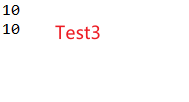/*
* JDK 5.0 新特性 自动装箱与自动拆箱
* */
@Test
public void test3(){
//int num1 = 11;
//基本数据类——》包装类对象
//method(num1);
//自动装箱
int num2 = 10;
Integer in1 = num2;
//自动拆箱
//包装类——》基本数据类型
System.out.println(in1.toString());
int num3 = in1; //自动拆箱
System.out.println(num3);
}
public void method(Object obj){
System.out.println(obj);
}
习题
@Test
public void test3(){
Integer i = new Integer(1);
Integer j = new Integer(1);
System.out.println(i == j); //false
Integer m = 1;
Integer n = 1;
System.out.println(m == n); //true
Integer x = 128;
Integer y = 128;
System.out.println(x == y); //false
}
Integer内部定义了IntegerCache结构,IntegerCache中定义了Integer[],
保存了从-128~127范围内的整数,如果我们使用自动装箱的方式,给Integer赋值的范围在-128~127范围内,可以直接
使用数组中的元素,不用再去new了。